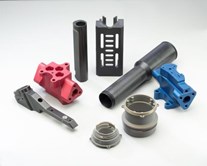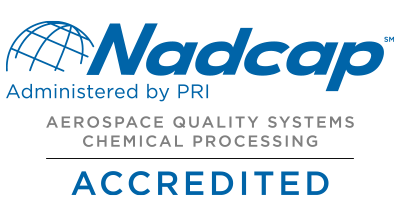What is Anodizing?
 Anodizing is an electrochemical conversion process that forms an oxide film, usually on aluminum, in an electrolyte (chemical solution). The aluminum parts are the anode (thus the term “anodizing”) and current is passed between them and a cathode, usually flat aluminum bars, through the above mentioned electrolyte (sulfuric acid is most commonly used).
Anodizing is an electrochemical conversion process that forms an oxide film, usually on aluminum, in an electrolyte (chemical solution). The aluminum parts are the anode (thus the term “anodizing”) and current is passed between them and a cathode, usually flat aluminum bars, through the above mentioned electrolyte (sulfuric acid is most commonly used).
There are different types of anodize, most commonly referred to as Type I-Chromic Acid Anodize, Type II-Sulfuric Acid Anodize, and Type III Hard Anodize or Hardcoat from the Mil-A-8625 designation.
How does anodizing increase corrosion resistance?
Anodizing changes the microscopic texture of the surface - thick coatings are normally porous, so a sealing process is often needed to achieve corrosion resistance.
Aluminium alloys are anodized to increase corrosion resistance, to increase surface hardness, and to allow dyeing, improved lubrication, or improved adhesion.
Although aluminum doesn’t rust, it can deteriorate in the presence of oxygen, which is called oxidation. When aluminum is exposed to the atmosphere it quickly forms a layer of aluminum oxide on the surface, and this layer provides a degree of protection against further corrosion.
Hardcoat anodizing, sometimes called Type III, offers greater corrosion protection and resistance to wear in extreme environments or with moving mechanical parts subject to a lot of friction.
For questions or more information on any of our finishes and custom coatings, or to get started on selecting the right finishes for your project Contact Us Today.
CONTACT US ONLINE (315) 471-6143
--













